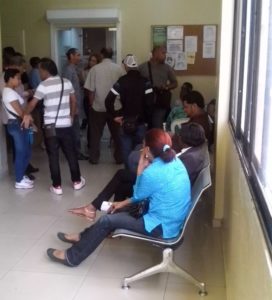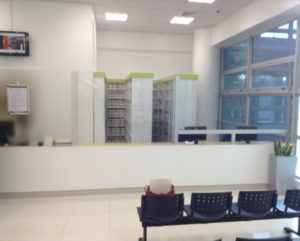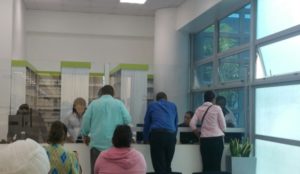Background
Within the framework of health sector reform, the National Health Service (Servicio Nacional de Salud) of the Dominican Republic has been implementing the Integrated System for Medicine and Supply Management (Sistema Único de Gestión de Medicamentos e Insumos, or SUGEMI) in the public health services network. Its objective is to improve public access to essential medicines and quality health care supplies by integrating the management of supplies for specialized programs of the Ministry of Public Health (Ministerio de Salud Pública, or MSP) under one administration and promoting decentralized management.

Since 2008, the High-Cost Medicines Program (Programa de Medicamentos de Alto Costo, or PMAC) has been responsible for the supply of medicines for high-cost, low-prevalence clinical interventions such as certain advanced-stage oncological treatments, leukemias, hepatitis B and C treatment, and immunological treatment for kidney transplants. In 2015 its coverage reached 8,868 patients at a cost of DOP 1.480 billion (USD 31 million), equivalent to 42% of the medicine budget for all of the MSP.
Until 2014, 70% of PMAC beneficiaries (approximately 6,207 patients) received their medicines at counters set up in the MSP’s own administrative offices. The dispensing space was limited and located in a hallway that was shared with other MSP personnel who would pass through the patient area in the execution of their daily work. Regulation 246-06, which regulates good pharmacy practices, establishes that the dispensing of medicines must be carried out by outpatient pharmacy services.
In May 2015 the MSP made a request to the US Agency for International Development (USAID) for technical assistance from the Systems for Improved Access to Pharmaceuticals and Services (SIAPS) Program for the development and implementation of a plan for transferring the dispensing of high-cost medicines from the administrative offices of the MSP to a hospital pharmacy that would meet the quality standards established in the Dominican Republic.
Intervention and Results
The following interventions were implemented by a team of professionals from the PMAC, the MSP, and SIAPS:
1. Classification of products by pathology, manner of administration, and formulation (tablets and injectables).
2. Development of operating procedures for dispensing of medicines for unsupervised, outpatient use (tablets, oral solutions) and supervised use (injectables). The procedures establish the chain of custody and the control logs up until delivery to the end user.
3. Training pharmaceutical personnel on operating procedures, good dispensing practices, and good pharmacy practices.
4. Identification of a specialized hospital with ease of access that has the resources and favorable conditions for outpatient dispensing and supervised administration of high-cost medicines. The selected hospital was the Rosa E. Tavares National Cancer Institute (Instituto Nacional del Cáncer Rosa E. Tavares, or INCART).
Download a PDF version of this story
Haga clic aquí para español
5. Remodeling of an INCART outpatient pharmacy so that it would meet with the standards established by the MSP and provide convenient services to patients. This pharmacy would be the only point of outpatient dispensing for oral formulations.
6. Identification of seven specialized hospitals for the supervised administration of intravenous medicines. These hospitals will not provide outpatient dispensing services.
7. Inventory and distribution of all products in tablet, oral solution, or subcutaneous self-administration formulations to the INCART outpatient pharmacy.
8. Inventory and distribution of products for supervised, intravenous administration to the seven hospitals selected for such purposes.


In August 2015, the MSP began dispensing high-cost medicines in the INCART outpatient pharmacy and the selected hospitals, and in doing so, came into compliance with best dispensing practices and current legal regulations.

